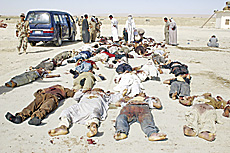BAGHDAD, 25 October 2004 — In one of their boldest attacks yet, insurgents waylaid three minibuses carrying Iraqi soldiers home on leave and massacred 49 of them — many of them shot in the head execution-style, officials said yesterday.
The killing of so many US-trained soldiers — unarmed and in civilian clothes — reinforced American and Iraqi suspicions that the country’s security services have been infiltrated by insurgents.
The country’s most feared group, headed by Abu Mussab Al-Zarqawi, announced in a statement on a website that it carried out the slaughter.
Elsewhere, a US diplomat was killed yesterday morning when a rebel-fired rocket or mortar shell crashed into the trailer where he was sleeping, the US Embassy announced.
Edward Seitz, an agent with the State Department’s Bureau of Diplomatic Security, was believed to be the first US diplomat killed in Iraq since the war began in March 2003.
The unarmed Iraqi soldiers were on their way home after completing a training course at the Kirkush military camp northeast of Baghdad when their buses were stopped Saturday evening by rebels near the Iranian border about 160 kilometers east of Baghdad, Interior Ministry spokesman Adnan Abdul-Rahman said.
Some accounts by police said the rebels were dressed in Iraqi military uniforms.
Abdul-Rahman said 37 bodies were found yesterday on the ground with their hands behind their backs and shot in the head execution-style. Twelve others were found in a burned bus, he said. Some officials quoted witnesses as saying insurgents fired rocket-propelled grenades at one of the buses.
“This was an execution. We found the dead lying face down by the roadside with a single bullet wound,”
said Ali Al-Kaaki, the National Guard commander.
Meanwhile, a US Marine F-18 Hornet jet struck an insurgent position yesterday in Fallujah, the US command said. Witnesses said six people were killed in the attack.
Fallujah, 65 kilometers west of Baghdad, is among the centers of the Sunni insurgency, and US commanders have spoken of a new offensive to clear rebel strongholds ahead of Iraq’s crucial elections in January.
Iraqi police and soldiers have been increasingly targeted by insurgents, mostly with car bombs and mortar shells. However, the fact that the insurgents were able to strike at so many unarmed soldiers in such a remote region suggested the guerrillas may have had advance word on the soldiers’ travel.
“There was probably collusion among the soldiers or other groups,” Diyala’s deputy governor Aqil Hamid Al-Adili told Al-Arabiya television. “Otherwise, the gunmen would not have gotten the information about the soldiers’ departure from their training camp and that they were unarmed.”
Last week, a US defense official told reporters in Washington that some members of the Iraqi security services have developed sympathies and contacts with the guerrillas. In other instances, infiltrators were sent to join the security services, the official said on condition of anonymity.
He cited a mortar attack Tuesday on an Iraqi National Guard compound north of Baghdad as a possible inside job. The attackers apparently knew when and where the soldiers were gathering and dropped mortar rounds in the middle of their formation. At least four Iraqis were killed and 80 wounded.
The extent of rebel infiltration is unknown. However, it raises concern about the American strategy of handing over more and more responsibility to Iraqi security forces so that US forces could be drawn down.
One American soldier was also wounded in the pre-dawn attack that killed Seitz, the State Department official. The attack occurred at Camp Victory, the headquarters of the US-led coalition’s ground forces command.
In Beijing, Secretary of State Colin Powell described Seitz as “a brave American, dedicated to his country and to a brighter future for the people of Iraq.”
US Ambassador John Negroponte said Seitz was a “committed professional” who served with distinction.
“He came to Iraq, as did his fellow Americans here, to help the Iraqis defeat terrorism and the insurgency, establish democracy, and rebuild their economy,” Negroponte said.
Elsewhere, insurgents attacked Iraq security patrols three times late Saturday in Samarra, 95 kilometers north of Baghdad, wounding two Iraqi soldiers, the US military said.
— Additional input from agencies


